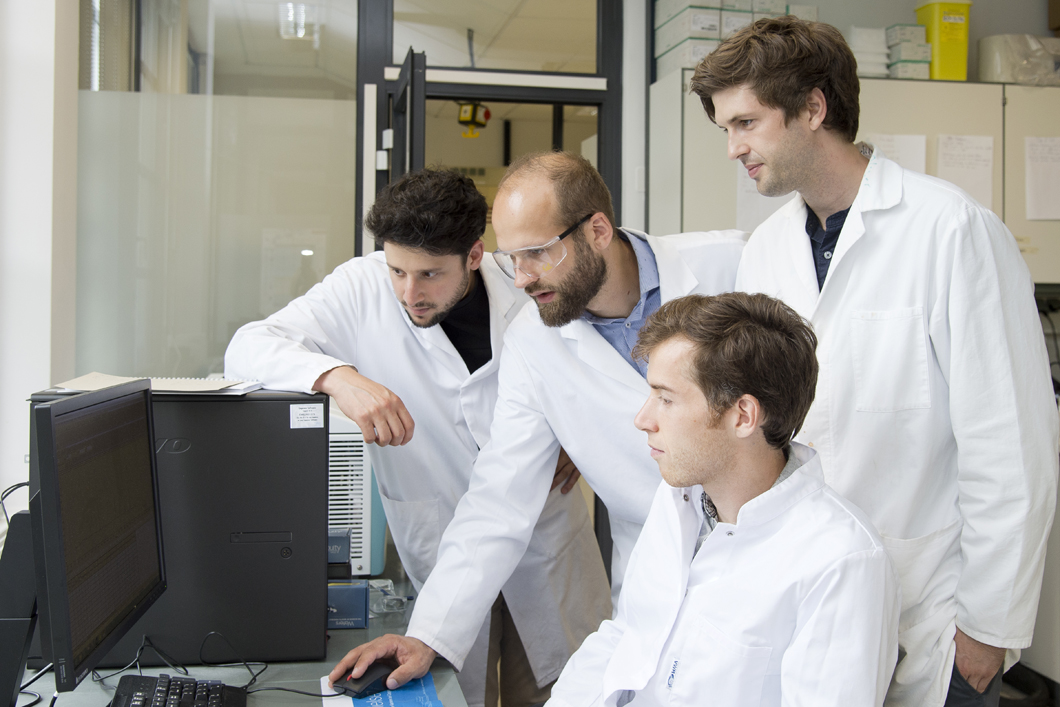
Dominik Sarma and the other founders Dr. Robert Zitterbart, Dr. Oliver Reimann and Andreas Regnery (from left to right) from the Belyntic Team
Source: BAM
Peptides are small and multi-talented, but expensive to manufacture. They are often used as active ingredients in pharmaceutical therapeutics and cosmetics because of their diverse properties. The Berlin start-up Belyntic has developed a new method to purify peptides, which can improve researchers’ lab work. BAM is supporting the start-up at its Adlershof branch with its know-how.
Peptides are protein building blocks that comprise long chains of up to 100 amino acids. In research peptides are mainly produced by scientists in a laboratory. To synthesise them amino acids are arranged piece by piece. The peptides must be available in pure form to be used in research and development and later as an active ingredient. During the synthesis, however, not only the desired peptide is created, but also numerous by-products which must be removed in a cleaning step.
Current cleaning methods are very time consuming and costly. Dr. Robert Zitterbart, one of the founders, was working on finding a viable solution to this problem during his Ph.D. thesis research. He succeeded in developing a less extensive purification process. Together with Dominik Sarma and Dr. Oliver Reimann he founded the start-up EnviroPep at the end of 2014 with the aim of marketing the solution. The spin-off has been funded by the German Federal Ministry for Economic Affairs and Energy (BMWi) as part of the EXIST programme. Since it is also a start-up project of the Humboldt-Universität in Berlin (HU), the researchers further receive support from the Humboldt-Innovation GmbH and the HU Start-up Service. In November 2016, business graduate Andreas Regnery joined the team. The founders plan to go to market under the new name Belyntic in 2018.
The cooperation between BAM and the founding team proved to be an ideal cooperation. Dr. Knut Rurack from the Chemical and Optical Sensing division has supported the initiative right from the beginning, since Sarma completed his master and Ph.D. theses in his division. The close collaboration between them facilitated the starting up of the company. BAM provides the young company with its expertise and excellent research facilities on its Adlershof Technology Park site.

The founders are developing a novel process for the simultaneous purification of chemically synthesised peptides in BAM’s laboratories.
Source: BAM
Learning from professionals: Quality assurance creates confidence
The cooperation with the start-up goes far beyond providing infrastructure for laboratory work and IT systems. “We want to help the founders already in the initial phase to lay the foundation for the professional handling of quality management, occupational safety and risk assessment,” explains Rurack. “These topics are part of BAM’s core business.” In his experience, many company founders underestimate the importance of quality management for later phases of a functioning company.
Sarma and his colleagues also confirm that their pathway from scientists to entrepreneurs requires a rethinking. “In the lab we were focused on our research,” says Sarma. The market perspective was rather insignificant. But during the first presentations about the peptide purification concept the founders realised that they need to set the tone. One of their target groups is the pharmaceutical industry. “This area is subject to strong regulations,” explains Sarma. “Thanks to BAM, we learned very early on which processes, for instance in quality assurance, our future customers expect from us. This is important in order to gain the confidence of potential business partners.”
Complex chemistry for practical solutions
The company founders know how difficult it is for newcomers to gain a foothold in the competitive pharmaceutical market. That is why the founders want to first build up a profitable business addressing other customer groups. In the beginning the company wants to target research teams, such as scientific institutes and universities and also peptide manufacturers. Belyntic is working to develop a simple kit that allows users to purify their peptide products. “When working with our process, we can achieve on average purities of more than 90 percent,” says Sarma.
To achieve this, the founders use a trick. They have developed a catch & release method. During the synthesis they attach a chemical anchor to the desired peptide – analogous to coupling the last amino acid. A modified filter material then separates the peptide via this anchor. “The underlying chemistry is complex, but using our method is intuitive and straightforward,” says Sarma and adds: “We can now purify 20 different peptides at the same time, which is not possible with any available method.” In addition, the method proves to be more environmentally friendly. “This is particularly interesting for large manufacturers because regulatory requirements are becoming tighter and customers increasingly consider environmental aspects important,” Sarma continues.
Implementing innovative ideas
Rurack expects that the collaboration between BAM and Belyntic will serve as a role model for other scientists. “BAM performs extensive application oriented research and we have a prolific patent and patenting system. But I would like to see more start-ups in the field of analytical and materials chemistry,” he says. The Belyntic example shows “how a young company works and what factors are important for starting a business.” Based on this new experience and BAM’s in-depth know-how, Rurack wants to put together an information package with application-specific expertise for other founders. This could benefit BAM teams who are considering a spin-off as well as start-ups from external start-up centres. “This increases the motivation to implement a good idea through founding your own company.”


